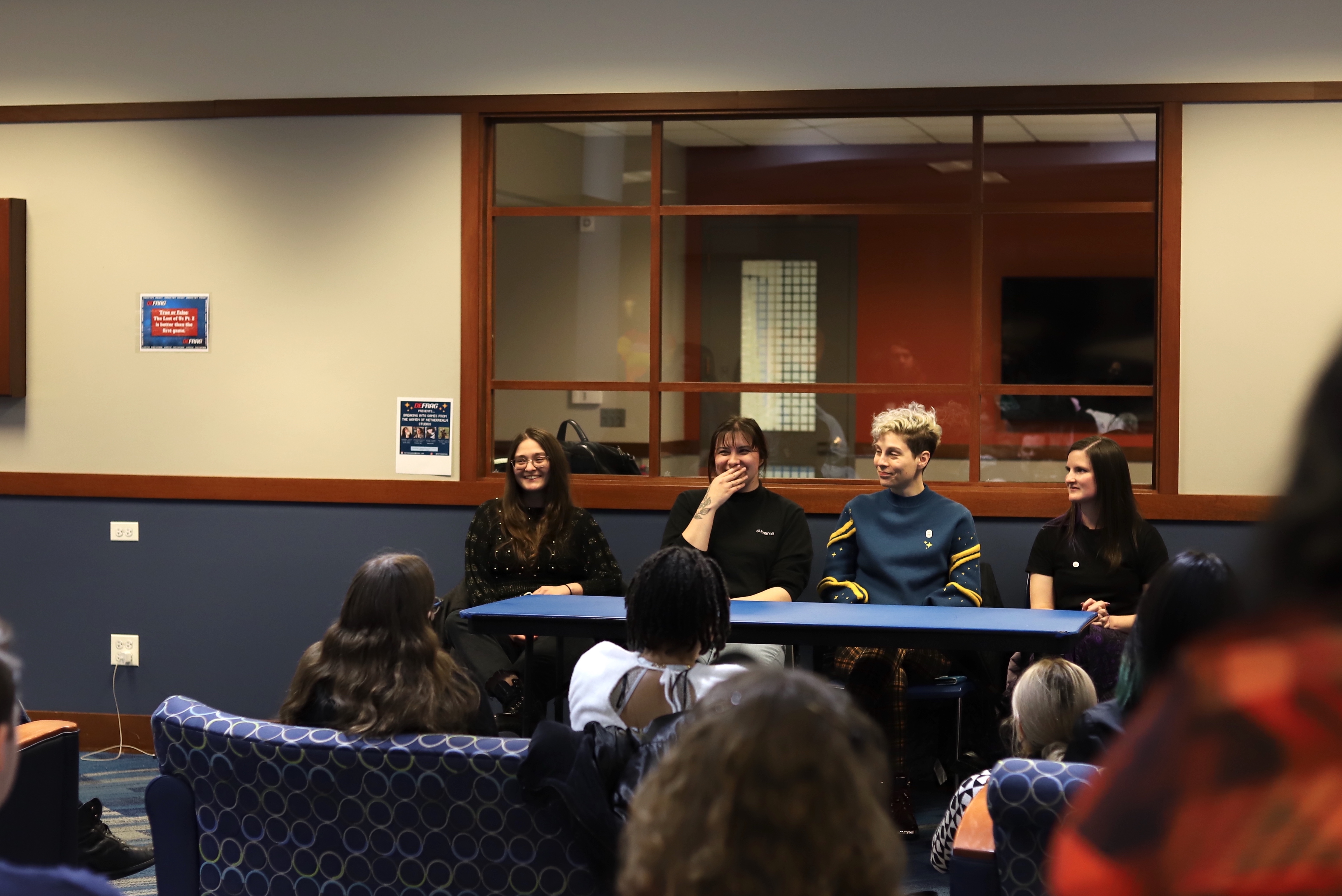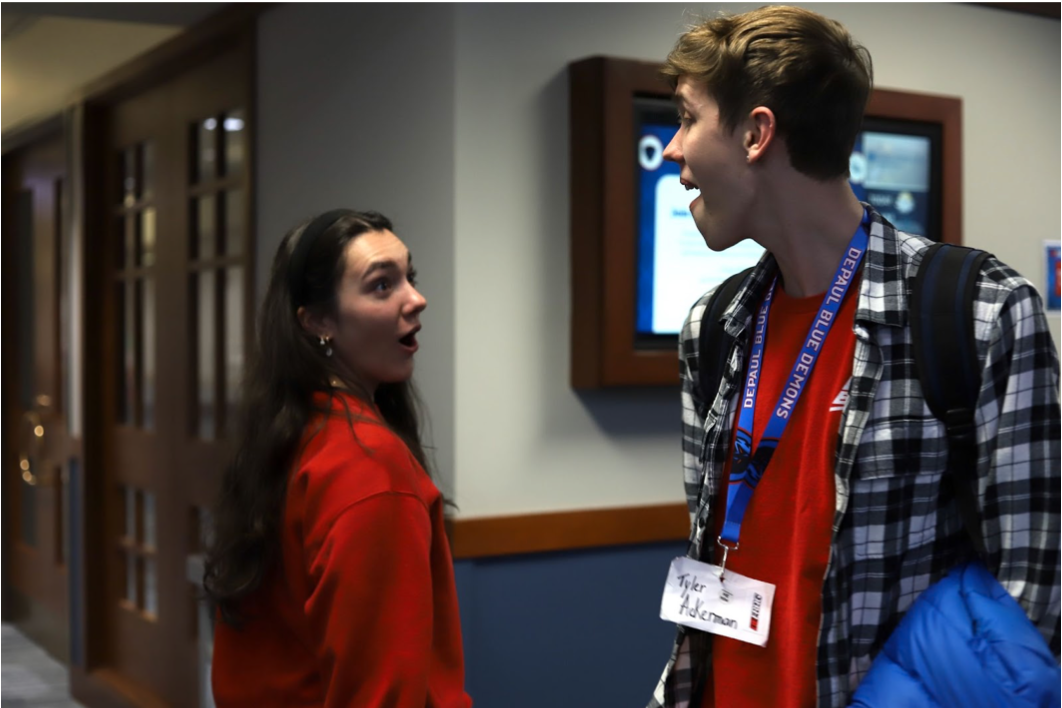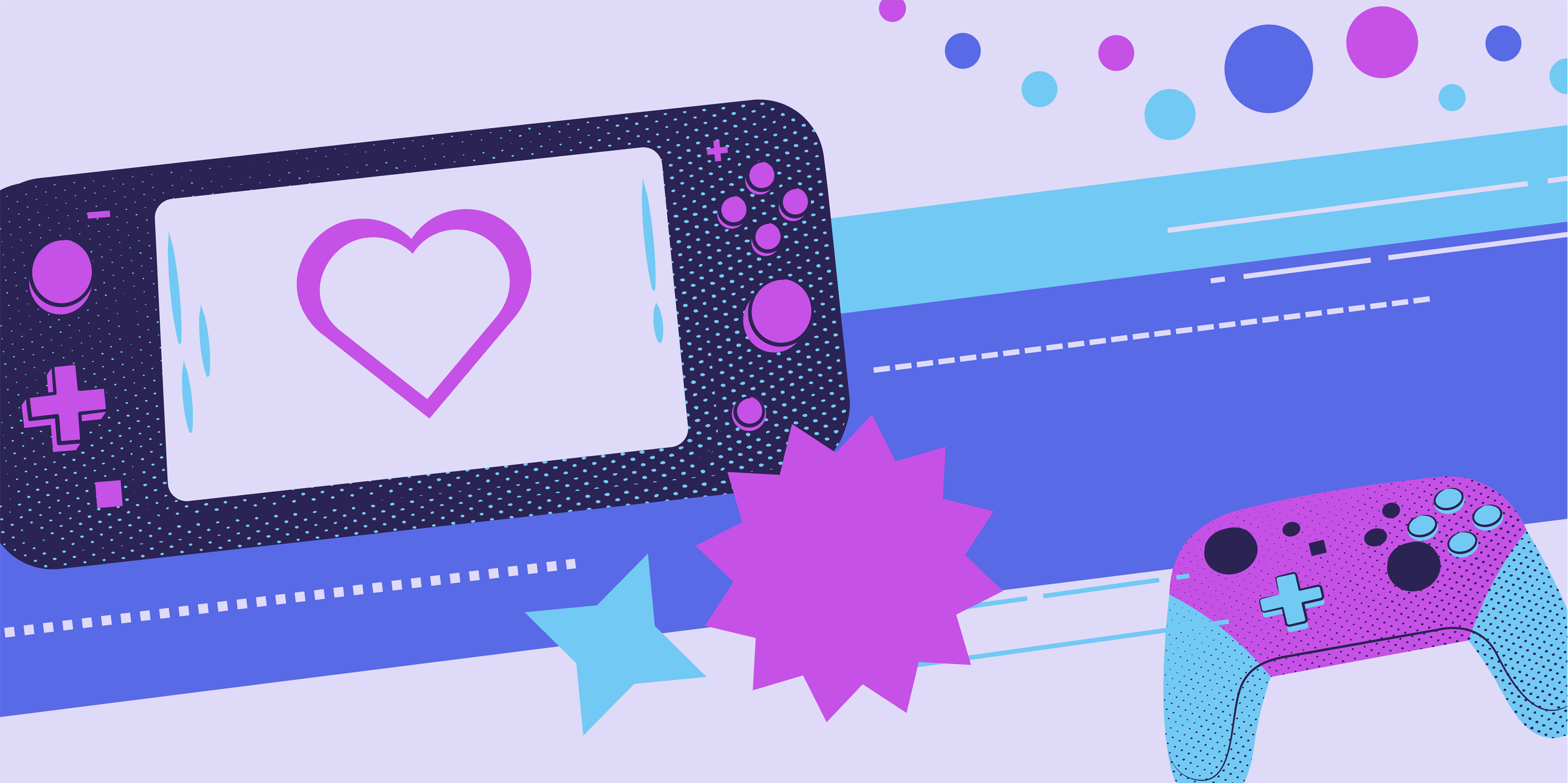On March 8, DePaul’s social gaming club, DePaul’s Fundamental Research in Academic Gaming (DeFRAG), hosted their “Industry Night: Women in Game Dev[elopment]” event at the Loop Campus Student Center.
Although the 11th floor of the DePaul Center is generally a desolate space after dark, the conversation volume was rising by the minute.
The lively commotion of portfolio reviews, check-ins, and visitors shifting between rooms to grab pizza indicated the beginning of a successful International Women’s Day event. DeFRAG is one of the largest social student organizations on campus. The club focuses on building a community surrounded by gaming degrees but is open to everybody.
The recent social event aimed to empower the voices of marginalized genders in the gaming industry and set students building their portfolios up for success.
“Everyone, it’s starting!” said SJ Singh, president of DeFRAG. After the announcement, nearly every attendee immediately abandoned their meals and conversations, forming rows around four women seated behind a plastic table.
The main event — the panel — welcomed four women from NetherRealm, the Chicago-based studio behind the game “Mortal Kombat.” During the panel, the employees spoke about their disciplines and experiences in the industry, then answered audience questions.
“I think a lot of times women especially tend to really freak out about … earning your place at a company like this,” said Kate Burnett, DePaul senior and intern at NetherRealm.

NetherRealm panelists interact with the audience during the Q&A portion of the event on March 8. Photo by Anna Retzlaff, 14 East
Burnett and Singh describe seeing people of the same gender in the game industry as encouraging. “I think it is disheartening when you don’t even see the people who … are like you. Just seeing women who are killing it and doing a great job is really, really cool to see,” Burnett said.
As of 2021, 23.6% of game developers were women, which is a notable increase from 2011, when it was 15.3%. Soon to be a full-time employee at NetherRealm, Burnett said she was initially nervous about joining the team as a young woman, but the studio’s environment exceeded her expectations.
“The people on my team are older than me, and most of them are guys, and … they really do their best to make me feel welcome,” Burnett said.
In LaPorte’s case, she has felt aware of being in a male-dominated field at times, “but for the most part, it hasn’t been too bad. Which I’m definitely lucky to be saying, because I know that is not the case for other people,” she said.
Singh shared a few negative experiences. In a game class at DePaul, “I was a very proactive member my freshman year, and one person implied I slept around to get where I am,” they said.
In recent history, the game industry has not been so welcoming to women. In 2021, the major studio behind “Call of Duty” Activision Blizzard faced a lawsuit over employee abuse and harassment.
The lawsuit against the studio reported a “pervasive frat boy workplace culture,” along with frequent sexual harassment and unequal pay. Once the investigation became public, a scandal soon followed.
Since the lawsuit, Activision Blizzard has increased resources for sexual harassment and discrimination prevention, as well as made a goal to increase women and non-binary staff by fifty percent by 2025.
In 2018, the maker of “League of Legends,” Riot Games, was sued for gender-based discrimination. Following a similar line of events, they agreed to a settlement of $100 million in 2021. Since the scandal, the company has invested in a diversity and inclusion team and increased its number of female employees.
Now, the efforts for inclusivity are starting to show results. Some games, such as “Valorant,” have begun to add characters of different genders, orientations and ethnicities. Singh believes we are entering an age of diverse storytelling.
“Everyday life is diverse … and it’s boring when you see, like, same white people, same cis[gender] people, every day on your screen, … because that doesn’t really reflect real life,” Singh said.
As the industry shifts to be more welcoming, students like Singh help empower them to enter male-dominated areas of the workforce through events like this. “It’s important to normalize female game dev[eloper]s. They’re here. They’re going to stay,” Singh said.
Attendees who might feel discouraged by their potentially alarming future workplace conditions were able to see people like them succeeding in the game industry. People could ask questions, get advice and witness the beginning of a more positive trajectory for diversity in the gaming world.
LaPorte had trouble convincing her parents that a degree in gaming was worth pursuing, and many of her peers share that similar experience. “Just because it’s games doesn’t mean it’s fun and not a real job,” LaPorte said.
Games are made for fun, but they are a serious business. Pokémon is the highest-grossing media franchise of all time, and gaming is the highest-grossing entertainment industry, outpacing film and music. Despite its massive success, many people in the community feel that the industry is unfairly dismissed.
“It’s way more complicated than people give it credit for sometimes. … I think the technical specifications of making such an elaborate thing is … a really crazy accomplishment of technology,” Burnett said. “Even if you don’t care for the end product.”
As people trickle out, the production comes to a close. The floor was reminiscent of a party when all but the host’s inner circle had gone home. Indistinct chatter had now become a few small conversations.

DeFRAG board members Madeline LaPorte (left) and Tyler Ackerman socialize at the end of the event. Photo by Anna Retzlaff, 14 East.
Those who were “board members” and “panelists” during the event shifted into casual friends, lingering, reflecting on the night. Eventually, they went home, and the Student Center transformed back into its ordinary, quiet state.
The next day, the space looked exactly as it did before. The carefully replaced furniture covers up signs that something important happened here. Voices of people that have been notoriously undervalued were given not just a seat at the table, but one entirely to themselves.
Header illustration by Madeline Smith




NO COMMENT